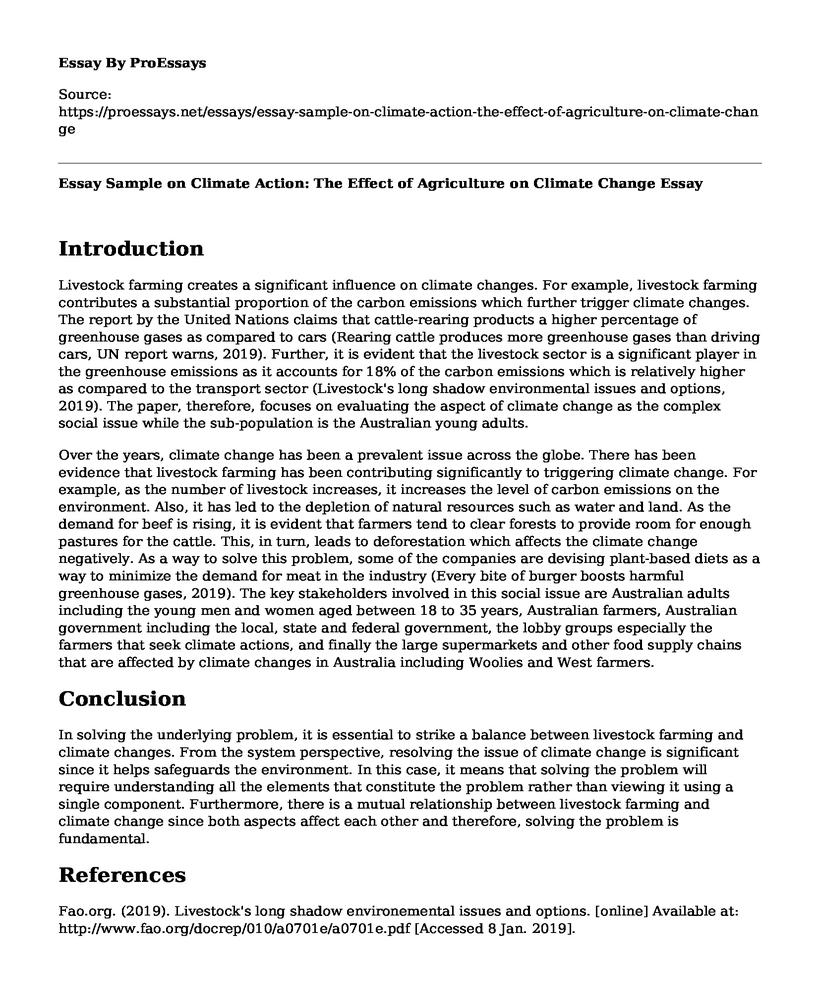Introduction
Livestock farming creates a significant influence on climate changes. For example, livestock farming contributes a substantial proportion of the carbon emissions which further trigger climate changes. The report by the United Nations claims that cattle-rearing products a higher percentage of greenhouse gases as compared to cars (Rearing cattle produces more greenhouse gases than driving cars, UN report warns, 2019). Further, it is evident that the livestock sector is a significant player in the greenhouse emissions as it accounts for 18% of the carbon emissions which is relatively higher as compared to the transport sector (Livestock's long shadow environmental issues and options, 2019). The paper, therefore, focuses on evaluating the aspect of climate change as the complex social issue while the sub-population is the Australian young adults.
Over the years, climate change has been a prevalent issue across the globe. There has been evidence that livestock farming has been contributing significantly to triggering climate change. For example, as the number of livestock increases, it increases the level of carbon emissions on the environment. Also, it has led to the depletion of natural resources such as water and land. As the demand for beef is rising, it is evident that farmers tend to clear forests to provide room for enough pastures for the cattle. This, in turn, leads to deforestation which affects the climate change negatively. As a way to solve this problem, some of the companies are devising plant-based diets as a way to minimize the demand for meat in the industry (Every bite of burger boosts harmful greenhouse gases, 2019). The key stakeholders involved in this social issue are Australian adults including the young men and women aged between 18 to 35 years, Australian farmers, Australian government including the local, state and federal government, the lobby groups especially the farmers that seek climate actions, and finally the large supermarkets and other food supply chains that are affected by climate changes in Australia including Woolies and West farmers.
Conclusion
In solving the underlying problem, it is essential to strike a balance between livestock farming and climate changes. From the system perspective, resolving the issue of climate change is significant since it helps safeguards the environment. In this case, it means that solving the problem will require understanding all the elements that constitute the problem rather than viewing it using a single component. Furthermore, there is a mutual relationship between livestock farming and climate change since both aspects affect each other and therefore, solving the problem is fundamental.
References
Fao.org. (2019). Livestock's long shadow environemental issues and options. [online] Available at: http://www.fao.org/docrep/010/a0701e/a0701e.pdf [Accessed 8 Jan. 2019].
UN News. (2019). Every bite of burger boosts harmful greenhouse gases: UN Environment Agency. [online] Available at: https://news.un.org/en/story/2018/11/1025271 [Accessed 8 Jan. 2019].
UN News. (2019). Rearing cattle produces more greenhouse gases than driving cars, UN report warns. [online] Available at: https://news.un.org/en/story/2006/11/201222-rearing-cattle-produces-more-greenhouse-gases-driving-cars-un-report-warns [Accessed 8 Jan. 2019].
Cite this page
Essay Sample on Climate Action: The Effect of Agriculture on Climate Change. (2022, Nov 19). Retrieved from https://proessays.net/essays/essay-sample-on-climate-action-the-effect-of-agriculture-on-climate-change
If you are the original author of this essay and no longer wish to have it published on the ProEssays website, please click below to request its removal:
- Technology Essay Example: Solar Panels
- Research Paper on the Climate Change
- How Monsters are Made? - Paper Example
- The United States Should Advocate for Electric Vehicles and Ban Gasoline Cars
- Effects of Overpopulation on the Environment Essay
- Article Analysis Essay on Wastewater Reuse for Irrigation: Nutrient Recovery & Waste Disposal
- E-Waste Recycling: Computer Equipment Reuse & Refurbishment - Essay Sample







